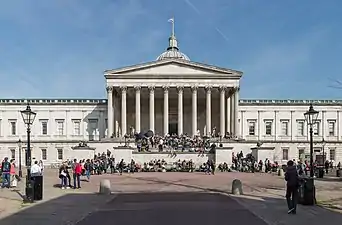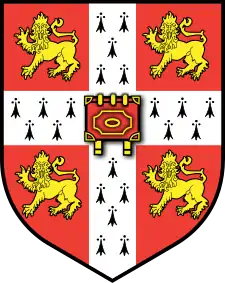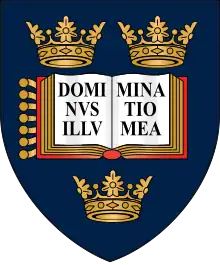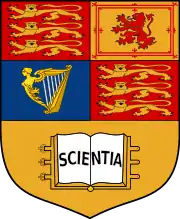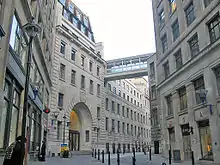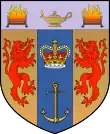Golden triangle (universities)
The golden triangle is an unofficial grouping of elite research universities located in the cities of Cambridge, London and Oxford in the southeast of England.[note 1] The triangle is occasionally referred to as the Loxbridge triangle,[7][8] a portmanteau of London and Oxbridge.
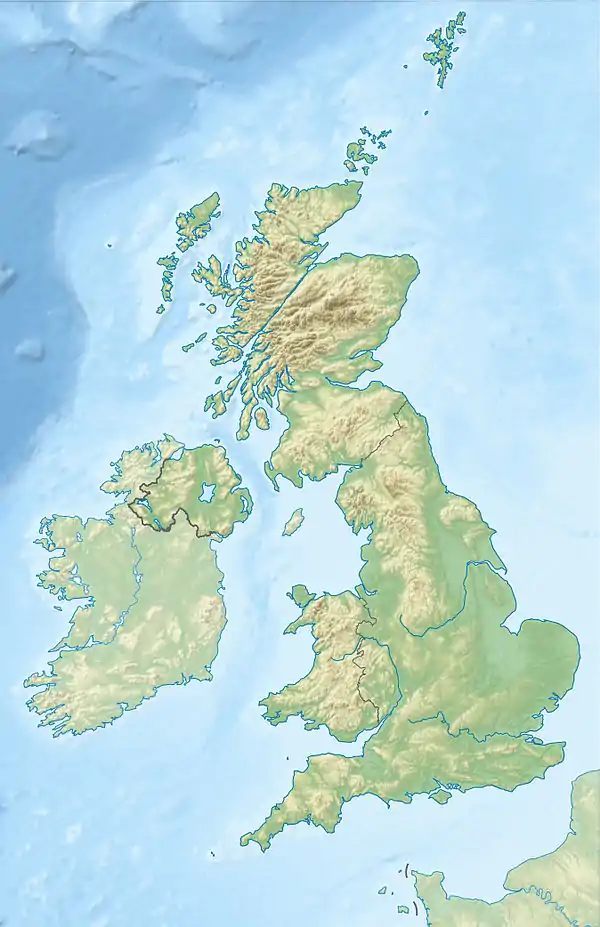
The corners of the triangle are formed by the University of Cambridge, the University of Oxford, and various universities in London. These are typically Imperial College London, University College London, King's College London, and the London School of Economics[9][note 2] (although some sources omit either or both of King's College London[note 3] and the London School of Economics).[note 4] Occasionally, other universities in London will also be included, such as the London Business School and the London School of Hygiene and Tropical Medicine.[20]
Members
Golden triangle universities possess some of the largest UK university financial endowments; endowment sizes range from UCL's £139 million (2019)[21] to Cambridge's £6.44 billion (including colleges)[22] Further, each university receives millions of pounds in research fundings and other grants from the UK government, criticised by leaders of some other universities as disproportionate and not in the best interests of the country as a whole.[23] In 2013/14, universities in Oxford, Cambridge and London received 46% of research funding in the UK, up from 42.6% a decade earlier.[24]
| Institution | Location | Undergraduate enrollment (2018/19)[25] | Graduate enrollment (2018/19)[25] | Total enrollment (2018/19)[25] | 2019 Endowment | Academic staff (2018/19)[26] | Motto | Colours | ||||||||||||||||||||||
|---|---|---|---|---|---|---|---|---|---|---|---|---|---|---|---|---|---|---|---|---|---|---|---|---|---|---|---|---|---|---|
| University of Cambridge | Cambridge, Cambridgeshire |
12,615 | 8,280 | 20,890 | £6.441 billion (including colleges) (as of 31 July 2018) | 6,215 | Hinc lucem et pocula sacra (From this place, we gain enlightenment and precious knowledge) |
|||||||||||||||||||||||
| Imperial College London | London, Greater London |
9,985 | 9,130 | 19,115 | £178.1 million[30] | 4,390 | Scientia imperii decus et tutamen (Knowledge is the adornment and protection of the Empire) |
|||||||||||||||||||||||
| King's College London | London, Greater London |
19,200 | 13,690 | 32,895 | £258.1 million[31] | 5,220 | Sancte et Sapienter (With Holiness and Wisdom) |
|||||||||||||||||||||||
| London School of Economics | London, Greater London |
5,055 | 6,795 | 11,850 | £155.0 million[33] | 1,725 | Rerum cognoscere causas (To Know the Causes of Things) |
|||||||||||||||||||||||
| University of Oxford | Oxford, Oxfordshire |
14,905 | 10,480 | 25,390 | £6.1 billion (including colleges) (as of 31 July 2018)[37] | 6,905 | Dominus Illuminatio Mea (The Lord is my Light) |
|||||||||||||||||||||||
| University College London | London, Greater London |
20,005 | 21,175 | 41,180 | £138.7 million[21] | 7,700 | Cuncti adsint meritaeque expectent praemia palmae (Let all come who by merit deserve the most reward) |
International students
Data published by Google in 2015 showed that the top 5 non-US universities searched for by US students were all in the golden triangle: Oxford, Cambridge, King's College London, UCL and the LSE; Imperial College London was seventh (behind Edinburgh).[39] Among UK providers with more than 10,000 students, the LSE had the highest proportion of non-UK students in 2018/19 at 67.5%, followed by Imperial at 52.7%, UCL in fourth (after University of the Arts London) at 47.7% and King's in 8th (after St Andrews, SOAS and Edinburgh) at 37.7%. Totals as of 2018/19 for non-UK students broken down by level of study are:[40]
| University | Non-UK students | Total students | Non-UK undergraduates | Total undergraduates | Non-UK taught postgraduates | Total taught postgraduates | Non-UK research students | Total research students |
|---|---|---|---|---|---|---|---|---|
| Cambridge | 7,350 | 20,890 | 2,890 | 12,615 | 1,820 | 3,325 | 2,640 | 4,950 |
| Imperial | 10,075 | 19,115 | 4,770 | 9,985 | 3,050 | 4,785 | 2,255 | 4,350 |
| King's | 12,385 | 32,895 | 6,760 | 19,200 | 4,625 | 11,075 | 1,000 | 2,615 |
| LSE | 8,000 | 11,850 | 2,650 | 5,055 | 5,015 | 6,300 | 335 | 495 |
| Oxford | 8,500 | 25,390 | 2,610 | 14,905 | 3,315 | 5,720 | 2,570 | 4,760 |
| UCL | 19,635 | 41,180 | 9,955 | 20,005 | 7,330 | 15,325 | 2,350 | 5,850 |
Rankings
World
Golden triangle universities generally do well on international rankings, which strongly reflect research performance. The LSE has, however, expressed concerns about a bias in rankings against smaller institutions and in favour of universities with large science, technology, engineering and mathematics programmes. Some global rankings, such as those produced by Times Higher Education (THE) and Quacquarelli Symonds (QS), correct for the sizes of institutions in calculating their results but others, such as the Academic Ranking of World Universities (ARWU), make no such adjustment.[41][42]
| University | Times Higher Education (2021)[43] | QS World University Rankings (2021)[44] | Academic Ranking of World Universities (2021)[45] |
|---|---|---|---|
| University of Cambridge | 6 | 7 | 3 |
| Imperial College London | 11 | 8 | 25 |
| King's College London | 35 | 31= | 47 |
| London School of Economics[note 5] | 27 | 49 | 151–200 |
| University of Oxford | 1 | 5 | 7 |
| University College London | 16 | 10 | 16 |
National
The Golden Triangle universities generally do well on British university league tables, with Cambridge and Oxford consistently in the top three, and Imperial and LSE ranked in the top ten by all compilers. UCL, however, misses out on a top ten place in the Guardian University Guide, while King's College London fails to make the top ten in any of the major rankings.
| University | Complete (2021)[46] | Guardian (2021)[47] | The Times (2021)[48] |
|---|---|---|---|
| University of Cambridge | 1 | 3 | 1 |
| Imperial College London | 5 | 9 | 5 |
| King's College London | 20= | 42 | 30 |
| London School of Economics | 4 | 5 | 4 |
| University of Oxford | 2 | 1 | 2 |
| University College London | 10 | 14 | 8 |
Research income
The institutions typically considered members of the triangle have among the highest research incomes of all British universities and collaborate closely through initiatives such as the G5,[49] Global Medical Cluster (GMEC),[50][51] MedCity,[52] and SES.[53] With the exception of the LSE, significant fractions of their research income come from clinical medicine, varying from 38.2% (Cambridge) to 58.9% (King's College London), compared to an average across the UK of 33.7%. Overall, 48.1% of the research income of the six institutions (48.8% excluding the LSE) comes from clinical medicine research. Overall, 31.9% of all research income of UK universities in 2018/19 went to one of the golden triangle institutions.[54]
The balance of funding between the 'golden triangle' and the rest of the UK has been questioned, and was specifically included in the terms of reference for an enquiry in 2018 by the House of Commons Science and Technology Select Committee.[55] According to defenders of the level of funding going to the golden triangle institutions, "The apparent concentration of research in the golden triangle is little more than a reflection of the distribution of people in the UK".[56] Analysis of grant proposals to Research Councils UK between 2012–13 and 2016–17 has shown that golden triangle institutions do not have unusually high success rates (two are actually below the expected range), but that the northern universities of Durham, Lancaster and York do.[57]
| Rank[54] | University | Research income (£m)[54] | Research income in clinical medicine (£m)[54] | Research income as proportion of total income (%)[58] |
| 1 | University of Oxford | 624.8 | 328.8 | 25.5 |
| 2 | University of Cambridge | 592.4 | 226.2 | 27.0 |
| 3 | University College London | 481.1 | 257.3 | 32.4 |
| 4 | Imperial College London | 368.0 | 175.6 | 34.3 |
| 8 | King's College London | 194.7 | 114.6 | 21.6 |
| 42 | London School of Economics | 33.3 | 0.0 | 7.9 |
Graduate earning power
Research in 2017 by the Institute for Fiscal Studies also indicates graduates from the LSE, Oxford and Imperial earn, on average, over £40,000 per year 5 years after graduation, making them the highest earners 5 years after graduation amongst British university graduates.[59]
Gallery
- Golden Triangle (Universities)
See also
- Ivy League (older private universities in the United States)
- Imperial Universities (Japan)
- C9 League The Chinese Ministry of Education's formal grouping of elite universities in China
- SKY (universities) (Korea)
- Institutes of National Importance (India)
- Research-intensive cluster
- Global Medical Excellence Cluster
- MedCity (London)
- G5
- Russell Group A formal grouping of research universities in the UK
- SES-5 A formal grouping of universities in the South East of the UK
- Group of Eight A formal group of eight universities in Australia
Notes
- Multiple sources state the golden triangle is formed around Oxford, Cambridge and London.[1][2][3][4][5][6]
- Multiple sources confirm the membership, although some omit either King's or LSE, as noted under their entries.[10][11][12][13][14][15][16][17][18][19]
- King's College London is not included by[8][11][12][15][16][18][19]
- LSE is not included by[10][15][16][18]
- The LSE made the following statement about university rankings in 2012: "At mid-2012, LSE has seen pleasing improvements over the last couple of years in our standing in all the main global rankings: those produced by Times Higher Education, QS and Shanghai Jiaotong University. We have also seen good rises in the domestic UK rankings. But we remain concerned that all of the global rankings – by some way the most important for us, given our highly international orientation – suffer from inbuilt biases in favour of large multi-faculty universities with full STEM (Science, Technology, Engineering and Mathematics) offerings, and against small, specialist, mainly non-STEM universities such as LSE."[41]
References
- "Oxbridge windfall". Times Higher Education. 4 August 1995.
A large amount of the cash awarded to humanities postgraduates still goes to the "Golden Triangle" of Oxford, Cambridge and London, British Academy figures reveal.
- Kershaw, Alison (4 October 2012). "UK universities slip in rankings". The Independent.
Rankings editor Phil Baty said: "Outside the golden triangle of London, Oxford and Cambridge, England's world-class universities face a collapse into global mediocrity.
- Andrew Ward (25 June 2015). "Johnson floats £10bn biotech fund for London". Financial Times.
MedCity was launched last year to increase collaboration between Imperial College, King's College and University College London – the capital's three main science universities – and promote the broader 'golden triangle' between London, Cambridge and Oxford to investors.
- Rebecca Marriage (11 March 2015). "UK confirmed as 'global education superpower' in international university rankings". ReLocate Global.
The 'golden triangle' of Oxford, Cambridge and London strengthened its grip on UK higher education: As well as Cambridge and Oxford rising closer to the summit, University College London moved up from 25th to 17th, the London School of Economics rose two places to 22nd and King's College London jumped eight places from 43rd to 31st.
- Mullins, Justin (23 April 2005). "England's golden triangle". New Scientist.
Take a look at any of the various league tables ranking universities around the world ... Oxford and Cambridge are in the top handful, while London's University College and Imperial College sit comfortably in the top 25. ... London, Oxford and Cambridge are a 'golden triangle' of academic success.
- Wiggins, Kaye (11 March 2015). "The World Reputation Rankings: UK's university 'golden triangle' strengthens grip".
The "golden triangle" of Oxford, Cambridge and London has strengthened its grip on the UK's higher education system, according to the latest global reputation rankings from TES's sister title Times Higher Education.
Cite journal requires|journal=(help) - Neuman, Michael (2018). "The Loxbridge Triangle: Integrating the East-West Arch into the London Mega-region". talks.cam.ac.uk. University of Cambridge.
- Morgan, K. J. (2004). "The research assessment exercise in English universities, 2001". Higher Education. 48 (4): 461–482. doi:10.1023/B:HIGH.0000046717.11717.06. JSTOR 4151567. S2CID 145505001.
- Mike Savage (5 November 2015). Social Class in the 21st Century. Penguin. p. 167. ISBN 9780141978925.
Higher education researchers often talk about a 'Golden Triangle' of universities. The 'triangle' describes an imaginary three-sided shape with corners in Oxford, Cambridge and London. The exact composition of the London 'corner' can vary, but typically it includes the London School of Economics, King's College London, University College London and Imperial College London.
- "Golden opportunities". Nature. 6 July 2005.
No longer rivals, Oxford, Cambridge and London are now working towards a common goal – ensuring the 'golden triangle' becomes a global science hub.
(Names Oxford, Cambridge, UCL, King's and Imperial) - Zoe Corbyn (26 November 2009). "In research, small is just as beautiful". Times Higher Education.
The findings reveal the full extent of the dominance of the golden triangle: papers from the universities of Oxford, Cambridge, University College London, Imperial College London, and the London School of Economics were cited far more often than the world average
(Names Oxford, Cambridge, UCL, Imperial and LSE) - "'Golden triangle' to win funding riches". Times Higher Education. 11 February 2010.
The other institutions in the Cambridge-Oxford-London 'golden triangle' – University College London, Imperial College London and the London School of Economics – will also receive big cash windfalls, as will the University of Manchester.
(names Oxford, Cambridge, UCL, Imperial and LSE) - Sean Coughlan (3 October 2013). "London top city in global university rankings". BBC News.
The so-called 'golden triangle' of UK universities – Oxford, Cambridge and leading London institutions – is seen as a breakaway elite group, with these universities consolidating their international reputations. Imperial College, University College London, LSE and King's College London are all in the top 40.
(Names Oxford, Cambridge, UCL, King's, Imperial and LSE) - Miriam Frankel; Alison Goddard; Gretchen Ransow (18 December 2014). "Golden Triangle pulls ahead in REF shake-out: UCL and KCL ascend power rankings, Manchester and Leeds fall" (PDF). Research Fortnight.
The top six universities in the so-called golden triangle—Oxford, UCL, Cambridge, Imperial, KCL and the London School of Economics and Political Science—have done particularly well in the Power Ratings.
(Names Oxford, Cambridge, UCL, King's, Imperial and LSE) - Jha, Alok (3 June 2003). "Gold rush". The Guardian.
The golden triangle of Oxford, Cambridge, University College London and Imperial College, show no sign of slowing down in their race away from the rest of the sector when it comes to research funding.
(Names Oxford, Cambridge, UCL and Imperial) - OECD Reviews of Regional Innovation OECD Reviews of Regional Innovation, North of England, UK. OECD. 2008. p. 222. ISBN 9789264048942.
The "Golden Triangle" of ... the universities of Oxford and Cambridge, Imperial College and University College of London ...
(Names Oxford, Cambridge, UCL and Imperial) - Grant, Malcolm (1 March 2005). "The future of the University of London: a discussion paper from the Provost of UCL" (PDF): 6. Cite journal requires
|journal=(help) (Names Oxford, Cambridge, UCL, King's, Imperial and LSE) - Clark, Paul (1 March 2002). "The golden triangle holds the secret". Times Higher Education.
Suppose, for the sake of argument, that the four institutions comprising the 'golden triangle' – Cambridge, Imperial College, Oxford and University College London – elect not to receive their block Higher Education Funding Council for England grant for teaching.
(Names Oxford, Cambridge, UCL and Imperial) - Jonathan Adams (5 June 2017). "We need to rethink research funding for UK regions to prosper". The Guardian.
"Currently, most R&D investment is concentrated in the south-east, London and the east, with the “golden triangle” universities of Oxford, Cambridge, University College London, Imperial College and the LSE taking over a quarter of the pot.
- "World Reputation Rankings 2014 results: UK's 'golden triangle' accounts for 8 of the country's 10 representatives in top 100". Times Higher Education. Retrieved 14 June 2017.
- "Annual Report and Financial Statements for the year ended 31 July 2019" (PDF). University College London. Retrieved 24 December 2019.
- "Accounts of the Colleges 2017-18" (PDF). Retrieved 11 June 2019.
- Rebecca Attwood (16 February 2007). "South secures research cash". Times Higher Education.
- "Golden triangle increases share of research funding".
- "Where do HE students study?". Higher Education Statistics Agency. Retrieved 1 March 2020.
- "Who's working in HE". Higher Education Statistics Agency. Staff numbers by HE provider. Retrieved 3 March 2020.
- "REPORTS AND FINANCIAL STATEMENT 2018" (PDF). University of Cambridge. Retrieved 11 June 2019.
- Colleges £3,188.2M,[22] University (consolidated) £3,253.0M[27]
- "Identity Guidelines – Colour" (PDF). University of Cambridge Office of External Affairs and Communications. Retrieved 15 July 2016.
- "Annual Report and Accounts 2018–19" (PDF). Imperial College London. Retrieved 24 December 2019.
- "Financial Statements for the year to 31 July 2019" (PDF). King's College London. Retrieved 24 December 2019.
- "Branding Essentials". Branding Essentials 10 August 2015. Archived from the original on 12 November 2015. Retrieved 15 July 2016.
- "Financial Statements for the year to 31 July 2019" (PDF). London School of Economics. Retrieved 24 December 2019.
- "LSE Shop". lseshop.com. Retrieved 29 April 2019.
- "Oxford University Colleges Financial Statements 2018" (PDF). University of Oxford. Archived (PDF) from the original on 11 April 2019. Retrieved 16 March 2019.
- "Financial Statements 2017/18" (PDF). University of Oxford. Archived (PDF) from the original on 23 February 2019. Retrieved 16 March 2019.
- Colleges £4.896 billion,[35] University (consolidated) £1.161 billion[36]
- "The brand colour – Oxford blue". University of Oxford. Retrieved 16 August 2013.
- Beckie Smith (11 February 2015). "London tops Google searches by US students". PIE News.
- "Where do HE students study?". HESA. HE student enrolments by HE provider. Retrieved 15 August 2020.
- "LSE in university league tables". London School of Economics. Archived from the original on 4 March 2016.
- Bahram Bekhradnia (15 December 2016). "International university rankings: For good or ill?" (PDF). Higher Education Policy Institute. Retrieved 26 May 2017.
- "World University Rankings 2021". Times Higher Education. Retrieved 27 September 2020.
- "QS World University Rankings 2021". Top Universities. Retrieved 27 September 2020.
- "ARWU World University Rankings 2021". www.shanghairanking.com. Retrieved 27 September 2020.
- "University League Tables 2021". Complete University Guide. Retrieved 27 September 2020.
- "The best UK universities 2021 – league table". The Guardian. 5 September 2021.
- "Good University Guide 2021". 20 September 2020.(subscription required)
- "Super elite in secret bid for cash boost". Times Higher Education. 6 February 2004. Retrieved 30 March 2014.
- "Universities". GMEC. Archived from the original on 6 March 2014. Retrieved 4 August 2016.
- "Collaborate and listen, The Guardian, Tuesday 19 December 2006"
- "MedCity launched to promote South East's science 'golden triangle'". BBC News. 8 April 2014. Retrieved 8 April 2014.
- "Research heavyweights deny 'ganging up'". Times Higher Education. 9 May 2013. Retrieved 30 March 2014.
- "Table 5 - Research grants and contracts - breakdown by source of income and HESA cost centre 2015/16 to 2018/19". Higher Education Statistics Agency. Retrieved 17 April 2020.
- "Balance and effectiveness of research and innovation spending inquiry launched". House of Commons. 20 July 2018. Terms of Reference. Retrieved 13 December 2018.
- Sarah Chaytor and Graeme Reid (6 December 2018). "Cuts to the golden triangle could leave the UK in bad shape". Times Higher Education.
- Alex Hulkes (27 September 2018). "Putting research in its place". ESRC.
- "Table 1 - Consolidated statement of comprehensive income and expenditure 2015/16 to 2018/19". Higher Education Statistics Agency. Retrieved 17 April 2020.
- https://www.bbc.co.uk/news/education-41693230
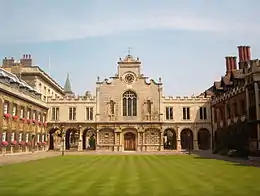
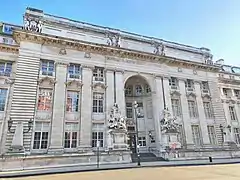
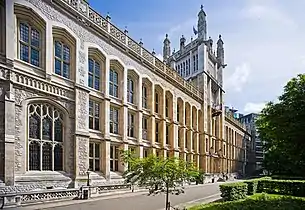
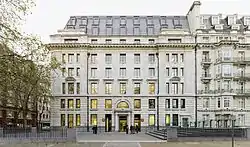
.jpg.webp)
